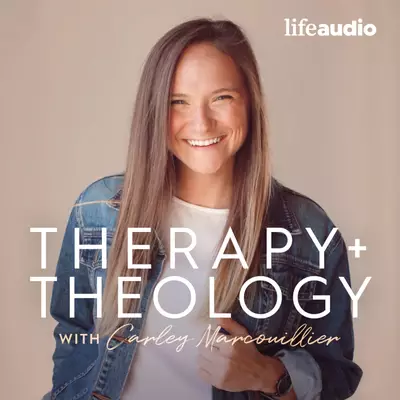Listen on Your Favorite App
Therapy + Theology with Carley Marcouillier
Carley Marcouillier
Are you looking for resources to better understand yourself and grow spiritually? You've come to the right place. Join licensed therapist Carley Marcouillier each week as she tackles a common question related to therapy, mental health, and faith.
Listen on Your Favorite App

Is Self-Care Biblical?

August 4, 2022 - 19 min
Today, we are tackling a question that has so much relevance today – both from a health perspective, but also from a spiritual perspective. Self-Care – is it biblical, or not? Sometimes, self-care can seem selfish, if not impossible in the busy schedules we maintain.But what is the effect of that busy lifestyle? We can emphasize what we do for God rather than who we are to him. Often our doing trumps our being. And the result can sometimes be burnout, and then guilt for needing a break.Admitting that we have needs is NOT a failure. Our need for rest is not only necessary for each of us, but biblical.In this episode, we discuss:- The benefits of self-care- Why self-care is sometimes looked down on (understandably so!)- How Jesus modeled self-care throughout his earthly ministry- How to start practicing self-care- The 4 areas of self-care (Physical/Emotional/Psychological/Spiritual) - Pete Scazzero’s 4 elements of Sabbath-keeping (stop/rest/delight/contemplate)RESOURCES:Pete Scazzero’s Emotionally Healthy Spirituality - https://amzn.to/3oLe8Ps ASK CARLEY!Do you have a question or topic you want to be discussed on a future Q+A episode? Carley would love to hear from you! Record your message here, and Carley just might answer it on the next episode! https://www.speakpipe.com/therapyandtheologyFOLLOW T+T on Instagram!https://www.instagram.com/therapyandtheologypodcast/FOLLOW CARLEY Website: https://www.carleymarcouillier.com/Be sure to sign up for her monthly newsletter with the latest in counseling research and faith integration! Discover more Christian podcasts at lifeaudio.com and inquire about advertising opportunities at lifeaudio.com/contact-us.
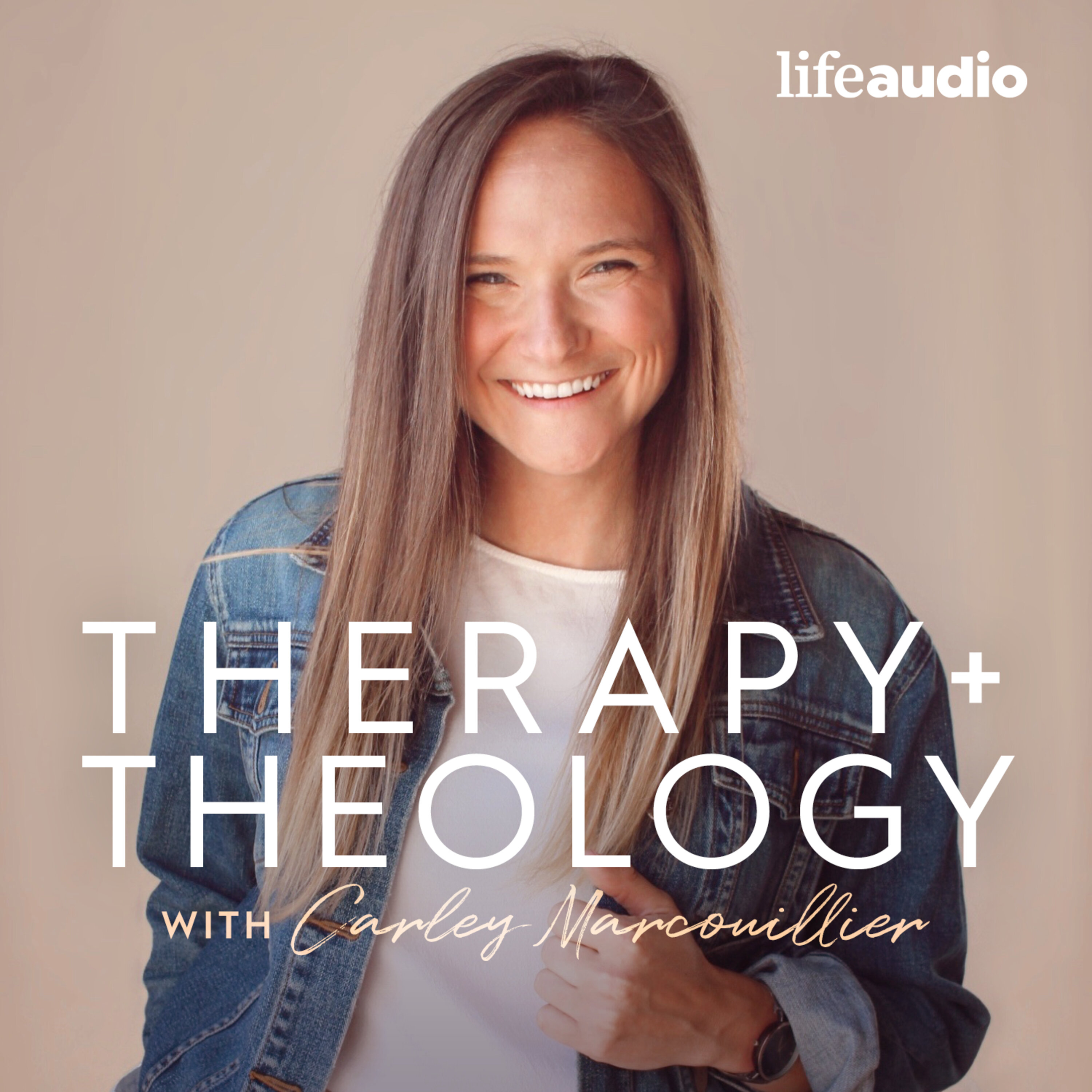
Getting Help: Where Do I Begin with Therapy?

July 14, 2022 - 16 min
If you've ever wondered what the first session of therapy is like, this episode is for you. In this episode, I share 3 steps for anyone who is thinking about getting counseling but isn't sure where to start.Today, we'll walk through each of these steps together:1. Start with your story 2. Find sacred spaces 3. Seek out spiritual resources ABOUT THE REBRAND:The producers at LifeAudio and I decided to rebrand my original podcast “Reframed: the power of perspective” to Therapy + Theology! My hope is that this change will capture the intention and direction of my purpose in each episode to explore a question or topic that correlates to the intersection between emotional health and spiritual well-being. ASK CARLEY!Do you have a question or topic you want to be discussed on a future Q+A episode? Carley would love to hear from you! Record your message here, and Carley just might answer it on the next episode! https://www.speakpipe.com/therapyandtheologyRESOURCES MENTIONED: Dr. Dan Allender - To Be Told Dallas Willard - Renovation of the Heart Brene Brown - Daring Greatly Daine Poole Heller- Power of Attachment THERAPY SEARCH WEBSITE:Psychology Today Christian Counseling Network ASK CARLEY!Do you have a question or topic you want to be discussed on a future Q+A episode? Carley would love to hear from you! Record your message here, and Carley just might answer it on the next episode! https://www.speakpipe.com/therapyandtheologyFOLLOW T+T on Instagram!https://www.instagram.com/therapyandtheologypodcast/FOLLOW CARLEY:Website: https://www.carleymarcouillier.com/ Discover more Christian podcasts at lifeaudio.com and inquire about advertising opportunities at lifeaudio.com/contact-us.
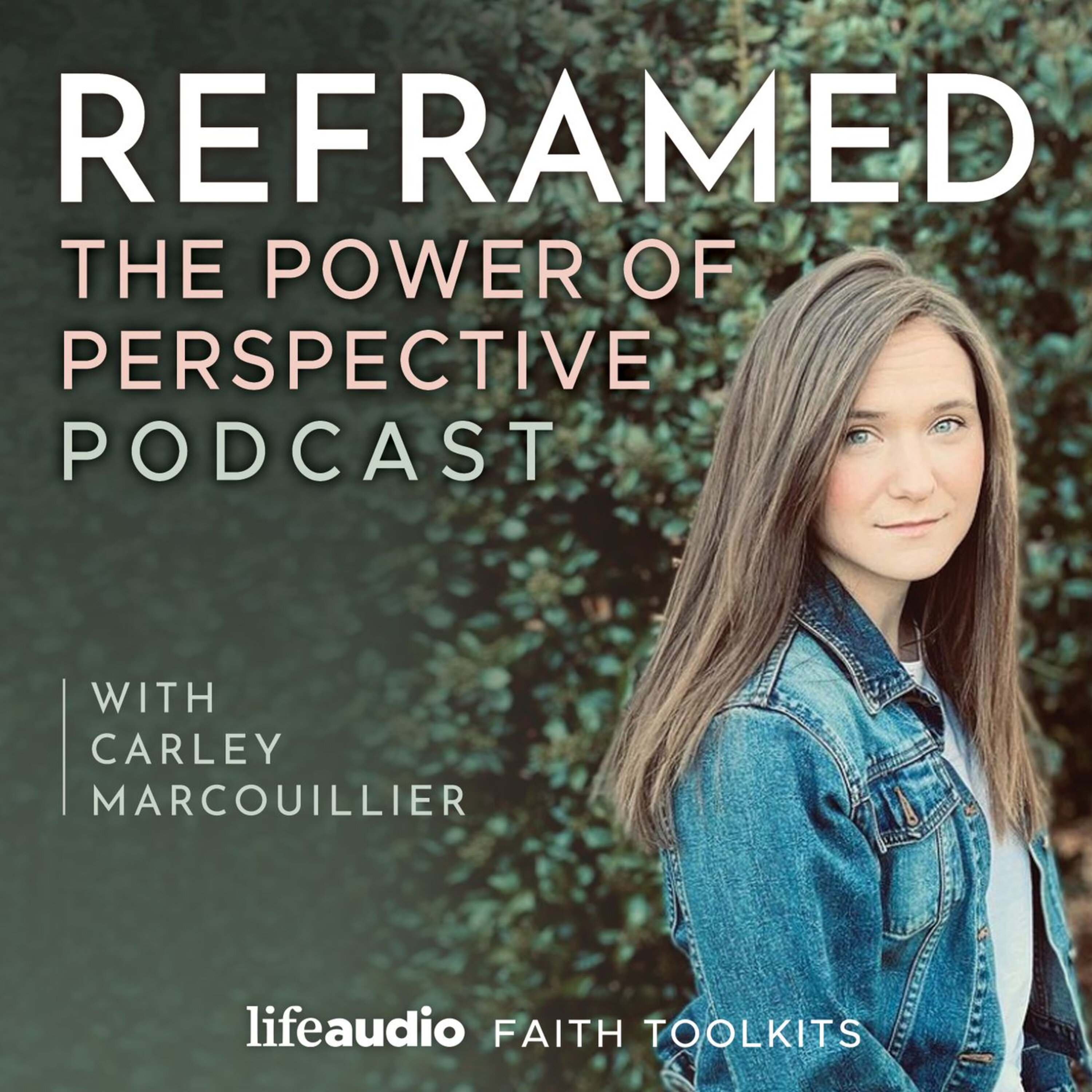
Coming Home: A New Way to Respond to Our Burdens

December 22, 2021 - 15 min
Episode 10: Coming Home: A New Way to Respond to Our BurdensThis is the final episode of the year, what a blessing this season has been for me and I hope to you also as we have walked through so many topics and truths to equip us in disputing discouragement and seeking abundant life we have through Christ. Today, I want to share something that the Lord has been teaching me through both my personal journey and the journeys of the many brave souls I have the honor to walk alongside. Something I do at the end of every year is look back through my journal entries and find themes and patterns in verses and prayers. Based on these findings, I set an intention for the coming year, to be grounded in those truths as a new season begins. At the start of 2021, I found that a major theme in my life was resting in the presence of God. This learning came from various sources and the Spirit’s leading, but the one passage of scripture repeated over and over again in my journal entries was Psalm 27. “One thing have I asked of the Lord, that will I seek after:that I may dwell in the house of the Lord all the days of my life,to gaze upon the beauty of the Lord and to inquire[c] in his temple.” Verse 4With this intention and assurance, to ask and seek, to pray and practice, to dwell and simply remind my soul to be with God no matter what I begin my journey into 2021. My prayer became: whatever, wherever, whenever - I want to dwell with the Lord forever. Little did I know that several unforeseeable challenges both internal and external would test this newly forming practice and position in my heart. One final practice:Let’s do this together. If you have a journal or want to come back to this when you have time to sit with it and reflect, I recommend taking time to write these things out and see them visually or talk them out with a friend or therapist. 1. Starting with this question: What are my burdens? List the things that are present in your heart, your world, your relationships. Here are some examples: Friendships, Discouragement, Specific sins, Loss, Change, Trauma /pain 2. Now draw a second column on the right of this list, write your needs for each of these burdens.Here are some examples: Friendships = I need belonging Discouragement = I need value. Direction, inspiration Specific sins = I need intimacy, connection, relief Loss = I need comfort Change = I need safety, provision Trauma /pain = I need healing, rest, comfort 3. Now, take each need: Belonging, volume, intimacy, etc - and look to scripture for responses to these needs. We are conditioned to think that the things of this world that were never meant to satisfy us would fill us. Yet, in our returning, again and again, we are empowered to wait for the day when our king will come to us again, and our joy will never again be taken from us! So, dear brothers and sisters, I encourage you to come home, daily, hours, moment my moment, and renew your vision and focus. Let us ask for the Lord, to be with him, to dwell with him, and bring our every need to him. Praying for you, thankful for you, and excited for the journey to come in 2022! Whenever, whatever, wherever, let us remember to come home! Getty/Polar Lights Discover more Christian podcasts at lifeaudio.com and inquire about advertising opportunities at lifeaudio.com/contact-us.
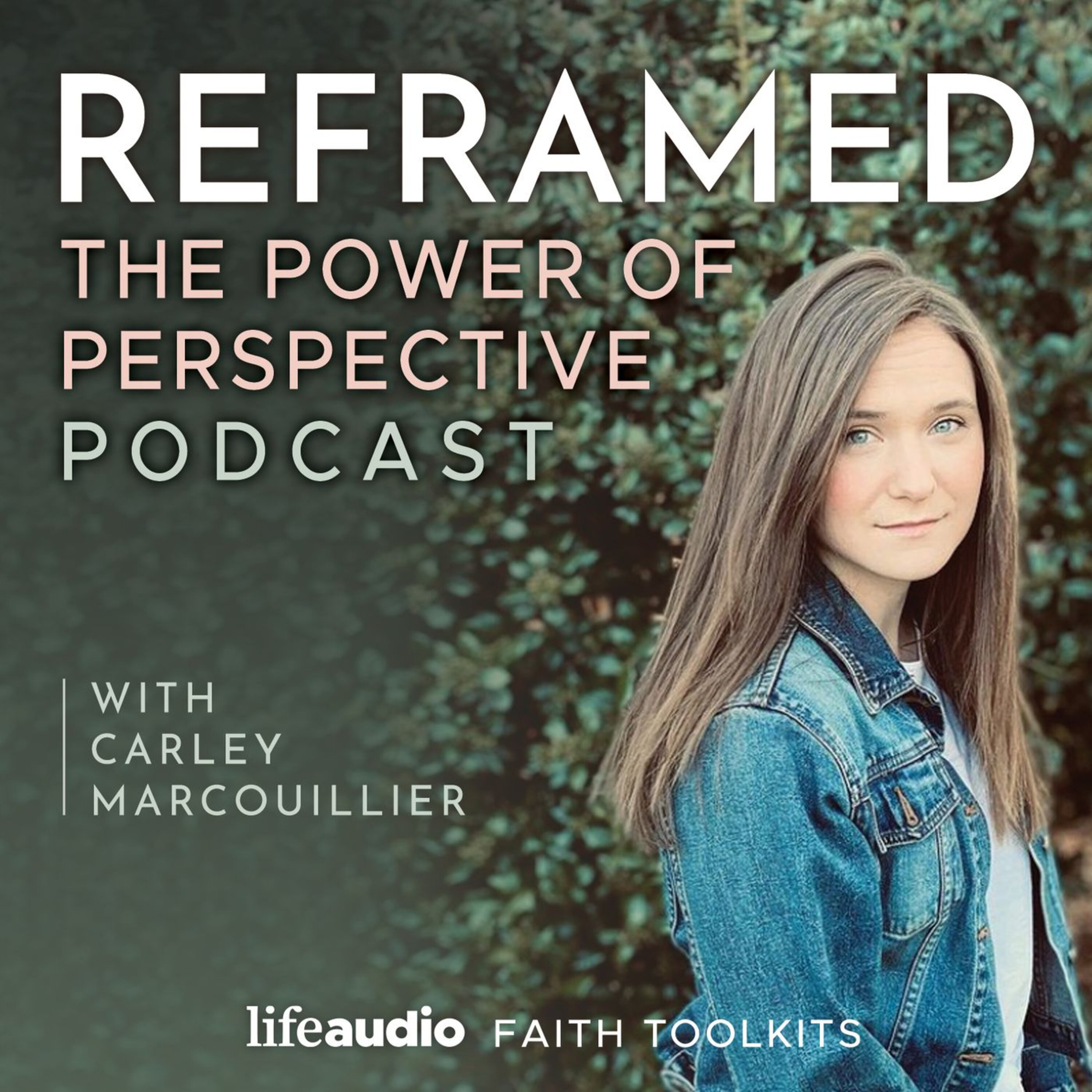
Redefining Family This Holiday Season

December 15, 2021 - 24 min
I cannot believe Christmas is around the corner and as I have been discussing with many of my client’s lately, with the holidays comes both excitement for rest but also some unpleasant realities of our family relationships. I often ask this question when meeting new clients: “describe your family in three words.” This quick exercise gives me a broad view of the family dynamics impacting my client’s perspective. In this episode, I want to explore our family origins and how those dynamics may be impacting us, especially during the holidays. I hope this will provide some encouragement for you to take into this Christmas season. Questions We Talk through In This Episode:1. What are the “messages” you grew up hearing?Messages are simply information via words or behaviors that convey values, expectations, and rules within an interaction. For example: a family message growing could be something like: “success is found in a good career” or ``emotions are a sign of weakness” or “don’t trust people,” etc. The messages we receive from our father and mother in many ways are the foundation for our core beliefs of self.2. What messages have negatively impacted you? What do you believe about yourself based on those messages you grew up hearing?Oftentimes we need to go back to go forward in our family relationships. Reflecting on the unhealed wounds and acknowledging the beliefs they have created in our hearts. But we cannot stop there...If we did, we would most likely become bitter towards those who have carelessly hurt us and lose hope in the possibility of having a sense of belonging that family gives us. Next Steps to Take toward Healing:1. Turn to God’s Word: As you reflect on the messages of your family of origin and the experiences that have shaped your perspective throughout life - how do they contrast with God’s fatherly language throughout scripture? 2. Remember You Belong to God’s Family: Whether you have close family or if you have lost loved ones, been hurt or abused by those who were supposed to be protective and trustworthy, I want you to know, despite it all, you are deeply loved and invited into a new kind of belonging within the family of God.3. Who Has God Entrusted to You? What does it look like to love those around us and invite them into the family of God so that they too can experience the hope, peace, joy, and love that we are celebrating this Christmas?I want to close with a letter I wrote some time ago as a reminder of God’s fatherly affection and I pray it will be a reminder for you as well this Christmas! My child, You are so precious to me (Isaiah 43) don't ever doubt how much I love you. Beloved, your life is valuable (Luke 12:15) and I never want you to forget that I have great plans for your life (Psalm 138, Philippians 1:6). Remember, I am with you always so stay strong and claim courage (Joshua 1:9). My sweet girl, I am so proud to be your Father, and I delight in your heart (Psalm 149:4, Zephaniah 3:17). Despite how this world may treat you, remember that nothing can separate you from my love (Romans 8:38-39). I cannot wait to have you home with me one day, but until then, hold tightly to my hand and walk with me daily (john 15:4). I am with you always, Your Heavenly FatherVerses for Study:Matthew 12:46-50; John 1:12-13; Romans 8:15; Galatians 3:26-29; Revelation 7:9; John 13:34-35Resources Mentioned:Emotionally Healthy Spirituality: https://amzn.to/3GOlxVoFollow Carley:Website: https://www.carleymarcouillier.com/Instagram: Discover more Christian podcasts at lifeaudio.com and inquire about advertising opportunities at lifeaudio.com/contact-us.

4 Reminders for Cultivating Community This Holiday Season

November 30, 2021 - 17 min
*Editor’s Note – Due to an error in post-production, Carley’s episode is publishing a week late. We're sharing anyway because so much of what Carley talks about can be applied throughout the holiday season and honestly, the entire year. Enjoy!*******We are back with a Thanksgiving week edition of The Reframed Podcast. I thought it would be fun to take this week and focus our attention on the gift of relationships and simple ways scripture encourages us to cultivate community. As messy and challenging as they may be, our relationships with one another are vital to our healing, growth and faith. As we have talked about in the past several episodes, there is much work to be done in learning the skills to steward are relationships well, yet as we come into the holiday season, I want to encourage our hearts towards gratitude and reframe our perspectives on the purpose and process of cultivating authentic community with those around us. Holiday Hang-Ups: When many come together to celebrate, we inevitably will face either memories of the past pain, or present dysfunction. What can happen in these times of holiday hurriedness is we can minimize or magnify the messiness of our relational connections. We can feel disconnected, lonely, left out, or limited by the challenges of finding a community that feels like home. Here is where reality remains: in both the joy and pain, grief and grace, struggle and sweetness of human connection. Four Reminders for Cultivating Community Something that we see set forth in scripture is the high priority on community. There are countless passages where we read of the focus and formation of community in what many call the “one another." It occurs 100 times in the New Testament. Approximately 59 of those occurrences are specific commands teaching us how (and how not) to relate to one another.1. Pray for one another (James 5: 13-16)How can we be praying with one another this holiday season? 2. Love one another genuinely (Romans 12:9-10)What does it look like to love one another and outdo each other in showing honor? 3. Forgive one another (Colossians 3:12-13)Who do we need to forgive or ask for forgiveness from in our community? 4. Encourage one another (Hebrews 10:23-25)What ways can you use your words, work, or gifts to encourage others in your community this holiday season? Let us press into what it means to be together this week and in the weeks to come, and seek to outdo one another in showing honor, fight for forgiveness, and bring encouragement into our times of celebration. A Prayer for Cultivating Community:Lord Jesus,Thank you for giving me such a vibrant community of friends to do life with. I praise you for the people you have blessed me with, the ones who have come alongside me to love, encourage, support, and uplift me through all the twists and turns of life. I'm so grateful that I do not have to go through life alone, but that you have shown me examples of your love through my dear friends. I pray that you would be present in my friendships, that you would be drawing us together into deeper community with one another toward greater unity with you. I pray that you would help heal any places of brokenness or discord in my friendships, and that you would restore any friendships that have fallen apart. Like your Word says in Colossians 3:12-13, may I clothe myself in compassion, kindness, humility, gentleness, and patience. May I be patient with my friends, and may I forgive freely like you have forgiven me. May I shine your light in my friendships, giving glory to you through all that I do, say, and think. Thank you for my friends, Jesus. Thank you for the ways they build me up and remind me of your goodness and faithfulness. (From: Crosswalk - Discover more Christian podcasts at lifeaudio.com and inquire about advertising opportunities at lifeaudio.com/contact-us.
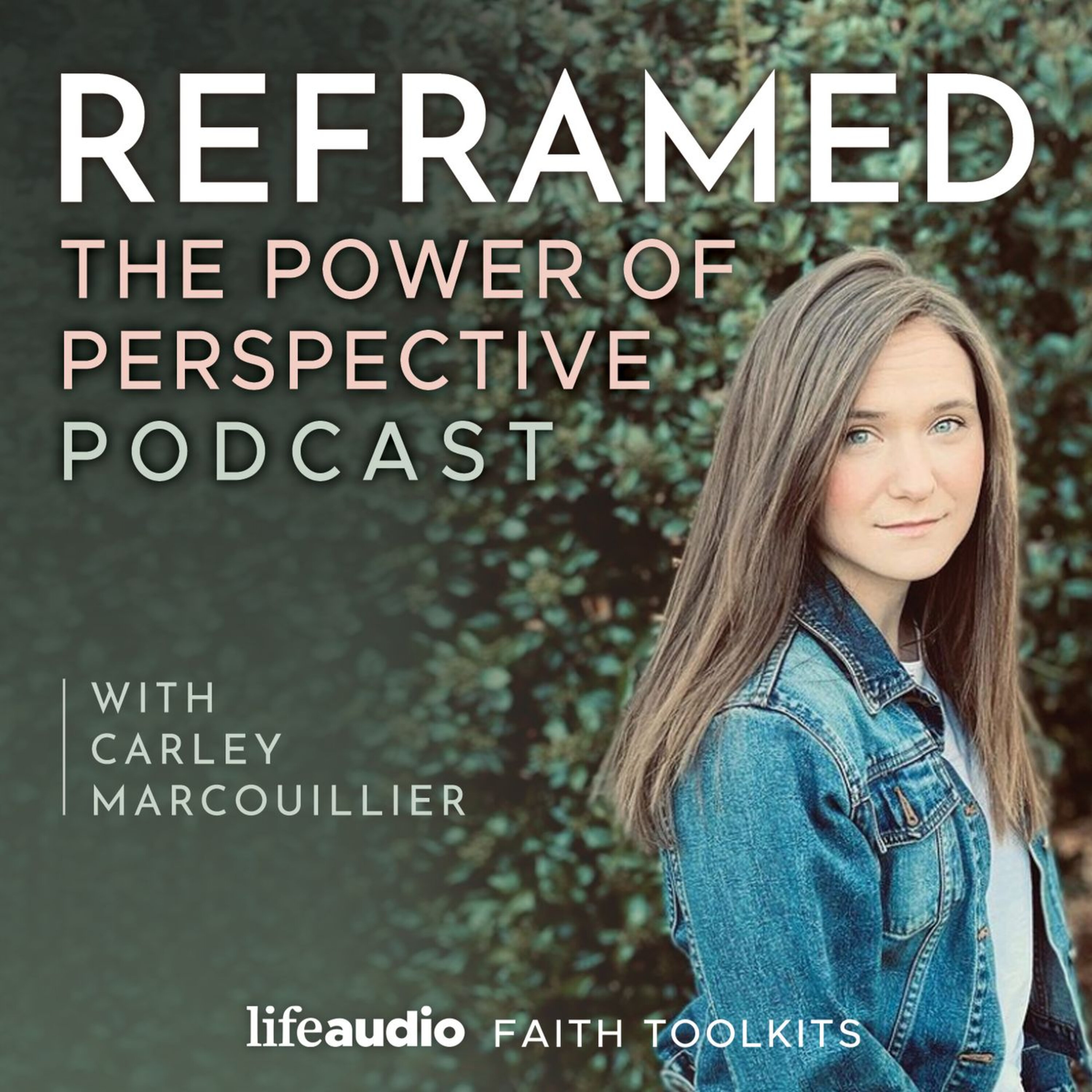
The Power of Repair: 5 Factors for Reconnecting in Your Relationships

November 10, 2021 - 32 min
**An earlier version of this episode cut the ending off. It is now fixed!**Over the past several weeks, we have been discussing topics related to relationships and learning to reframe our perspectives through scripture and communication skills. I have titled today’s episode, “The Power of Repair” because when it comes to the important relationships in our lives, repairing is one of the most powerful skills to maintain unity, increase intimacy, and build lasting connections. Although I briefly touched on the topic of conflict resolution in communication in other episodes, today, I want to dive deeper into the psychological benefits of practicing relational repair and provide some practical ways to foster the biblical commission of forgiveness. Conflict, hurt, misunderstandings, differing personalities and different perspectives all play a part in the way we interact with each other. If you have been to therapy or explored your family patterns in some way, you will learn how much our current patterns have been impacted by the perspectives and experiences of our early childhood. With this in mind, we must go back to go forward. By understanding our early connective experiences, we can reframe our current functioning and create a foundation for healthy interactions.What we cover in this episode:1. Attachment theory – what it is, who pioneered the concept, and how knowing our attachment style helps us understand how we approach relationships and how to foster healthy bonds with others.2. Why one of the most important secure attachment skills we can engage in is Repair – and how to practice repair in your relationships. The absence of repair fuels resentments and distrust. Here is the problem: Many of us have not learned to repair. Our family’s rules and roles within our given systems are at times unhealthy and leave us with a damaged view of how to communicate our needs, wants, feelings, and hurts. But believe it or not, even in our fighting and arguments, we are subconsciously seeking repair and reconnection: Here is a great example I use a lot with my clients: Say your spouse or friend says something like, “You never make time for me anymore” or Your child says, “You don’t pay attention to me.” Oftentimes, we respond in defense of ourselves without hearing the underlying messages- You never make time for me is really - “I miss you and desire to connect with you” You don't pay attention to me is really - “See me, love me, attune to me” Our attachment behaviors often reflect that of our child-like behaviors from either aggressive tantrums or silence that speaks volumes. We communicate in one form or another our desire for connection. Five factors that foster reconnection: 1. Time - Timing is everything. Giving time to respond and accept repairs and not allowing time to be used as a punishment or way to remain disconnected. In Proverbs 12:18 we read, “The words of the reckless pierce like swords, but the tongue of the wise brings healing.” “You must put off falsehood and speak truthfully to your neighbor, for we are all members of one body. “In your anger do not sin”: Do not let the sun go down while you are still angry, and do not give the devil a foothold. Do not let any unwholesome talk come out of your mouths, but only what is helpful for building others up according to their needs, that it may benefit those who listen” (Ephesians 4:25-27;29). 2. Self-awareness - Triggers and tendencies need to be named so that we enter a repair with knowledge of our patterns. “A gentle answer turns away wrath, but a harsh word stirs up anger.” Proverbs 15:1 “See to it that no one falls short of the grace of God, and that no root of bitterness springs up to cause trouble and defile... Discover more Christian podcasts at lifeaudio.com and inquire about advertising opportunities at lifeaudio.com/contact-us.

“They Just Don’t Care about Me” and Other Stories We Believe

October 27, 2021 - 22 min
Today’s episode dives into another relational topic that impacts our communication and the quality of our interactions. I'm sure we all can relate to the frustration of nothing being understood and at other times not understanding those we love. This pattern called “Mind reading” is built on the foundation of unchecked assumptions. The stories we tell ourselves have an enormous impact on our emotions and perspectives and when those stories begin to write the narratives of our relationships with others, it can cause unneeded conflict and misunderstandings. Mind reading is under the umbrella of cognitive distortions which jump to Conclusions- This means that our brains seek to Interpret the meaning of a situation with little or no evidence.As you probably have experienced, This Irrational thinking pattern quickly influences our feelings within relational contexts and consequently interferes in many ways in the way we perceive and engage in relationships. Why Do We Mind Read? It is our brain’s way of seeking to control outcomes by anticipating how to respond. Reason to Reframe: The importance of reframing our perspective around this topic will tremendously help us in reducing internal distress and increase our ability to connect with those around us by communicating our thoughts and feelings openly and clarifying our assumptions to maintain unity and respect. Reframing with Truth: Look back to Scripture and realize that God’s Word addresses these underlying relational patterns. Questions to ask yourself: Do I know that to be true? Have I clarified? An inversion of assumption is expectation. We often expect someone to do something, say something, or be a part of something without communicating our needs and desires. The issue with unverbalized expectations is that we often make assumptions based on them. People cannot meet expectations that have not been communicated or agreed upon. Questions to ask yourself:Do we have expectations that are not being met? Have our expectations been verbalized? Do we feel that others have unrealistic expectations of us? Do we need to clarify? Sometimes our perceived expectations can be untrue yet we can approach our relationships with the frustration or pressure to meet such expectations. This week, let’s become aware of our tendency to read minds and take time to communicate our thoughts, clarify our perspectives, and pursue understanding and unity in our relationships! Show Resources: https://www.emotionallyhealthy.orghttps://positivepsychology.com/cognitive-distortions/Follow Carley:Website | Instagram | FacebookTo access more content and join my monthly email list for the latest episodes and info, visit my website at carleymarcouillier.comEpisode Image Credit: Getty/Rudzhan_Nagiev Discover more Christian podcasts at lifeaudio.com and inquire about advertising opportunities at lifeaudio.com/contact-us.

4 Reasons Why You Have a Hard Time Saying “No”

October 13, 2021 - 33 min
From boundaries, communication, differentiation, loneliness and community etc. There are many important truths and techniques to support us in developing healthy and God honoring relationships with those around us. I am finding that to love those around me well, I must start with uncovering messages I have believed, addressing patterns of unhealth, and reframing my perspective through practice and prayer. So, today’s episode is going to focus on one of the most common questions brought into therapy. Why is it so hard to say “no”? I am learning, slowly, that whether professionally or personally, I must find my edges. Learn my limits, and communicate my choices clearly. AKA we need to know and name our boundaries. These spoken or unspoken relational lines are meant to help us distinguish where we end and others begin. One of the easiest ways to test the quality of your boundaries is to ask yourself two simple questions:Do I say no? Do I apologize for my limits? If you answered yes to either then you are in good company. So, the question is WHY? What motivates us to contradict our capacity, push ourselves beyond our limits or dismiss our needs, feelings, and values? The top 4 reasons you have a hard time saying no:1. Guilt of letting people down – this is the most common reason2. Need to “help” others in over to be loved – “Am I doing this -for- love, or -from- love?”3. Needing to please people 4. Need of acceptance What Are the Consequences of Not saying No? These symptoms may be present if you don’t implement boundaries: 1.Enmeshment /Codependency 2.Emotional distress3.Resentment 4.Guilt/fear cycle Let’s reframe our perspective. Here’s what boundaries are NOT… 1. walls2. others’ responsibility 3. equal 4. selfishWhat boundaries ARE … 1. Relational Tracks 2. property lines of one’s personal power 3. individualized4. self-care Boundaries 3 key components: 1.Ownership - personal power 2.Choice - yes and no 3.Responsibility - invitation vs. expectation Practices: 1.Check in and invite God in too 2.Explore your values by going back to God’s word 3.Name your limits 4.Take small bites - build with small no’s Show Resources: https://www.boundaries.mehttps://www.emotionallyhealthy.orgFollow Carley:Website | Instagram | FacebookTo access more content and join my monthly email list for the latest episodes and info, visit my website at carleymarcouillier.comEpisode Image Credit: Getty/Elenabs Discover more Christian podcasts at lifeaudio.com and inquire about advertising opportunities at lifeaudio.com/contact-us.

How You Talk to Yourself Matters to God

September 1, 2021 - 27 min
Over the last few weeks, we have been looking at the important topics surrounding mental health and today I want to discuss one of the most discussed topics within my work as a therapist. Self-talk. So, what is Self-Talk? Self-talk is your internal dialogue. It's influenced by your subconscious mind and it reveals your thoughts, beliefs, questions, and ideas. Self-talk can be both negative and positive. It can be encouraging, and it can be distressing.Psychology Today explains that “our inner voice, or self-talk, combining conscious thoughts and unconscious beliefs and biases, provides a way for the brain to interpret and process daily experiences.Our self-talk can be cheerful and supportive or negative and self-defeating. Self-talk can be beneficial when it’s positive, calming fears and bolstering confidence. Human nature, unfortunately, is prone to negative self-talk, including sweeping assertions like “I can’t do anything right” or “I’m a complete failure."Reason to Reframe: Recently, my pastor asked a thought-provoking question to the congregation in regard to self-talk, he asked: “What story are you telling yourself?” You see, the narrative we believe about ourselves will have a significant impact on the way we live our lives, view ourselves, and our image of God. These narratives often come from childhood messages, adverse experiences and internal evaluations of our self-perception. The stories we tell ourselves directly impact our self-concept, Self-esteem & self-worth. These can in many ways limit our full expression of personality. So, Why does this matter to God? The simple answer to this question is that our negative self-talk reflects a heart that believes lies over truth. Jesus says that out of the heart the mouth speaks. So, what is our heart believing? Is it reflective of our identity as children of God? Think about your most recent internal dialogue. Maybe the thing you told yourself when you missed an A on an exam, or disappointed your boss at work. Maybe it's the thing you tell yourself when you see your reflection in the mirror, or when you fail to be the parent, or spouse, or friend you think you should be. Now, listen to how God talks about you… Isaiah 43:1-4 - Loved, called, and chosen 2 Corinthians 5:17 - New creation Ephesians 2:10 - God’s workmanship 1 Peter 2:9 - Royal and holy people Romans 8:2 - Free from condemnation Romans 8: 38-39 - More than conquerors 1 John 3:1- Children of God Self-compassion practice: Critical self, Wounded Self, Compassionate self Resources: Gentle & Lowly - Dan Ortland Episode Image Credit: Ponomariova Maria Discover more Christian podcasts at lifeaudio.com and inquire about advertising opportunities at lifeaudio.com/contact-us.
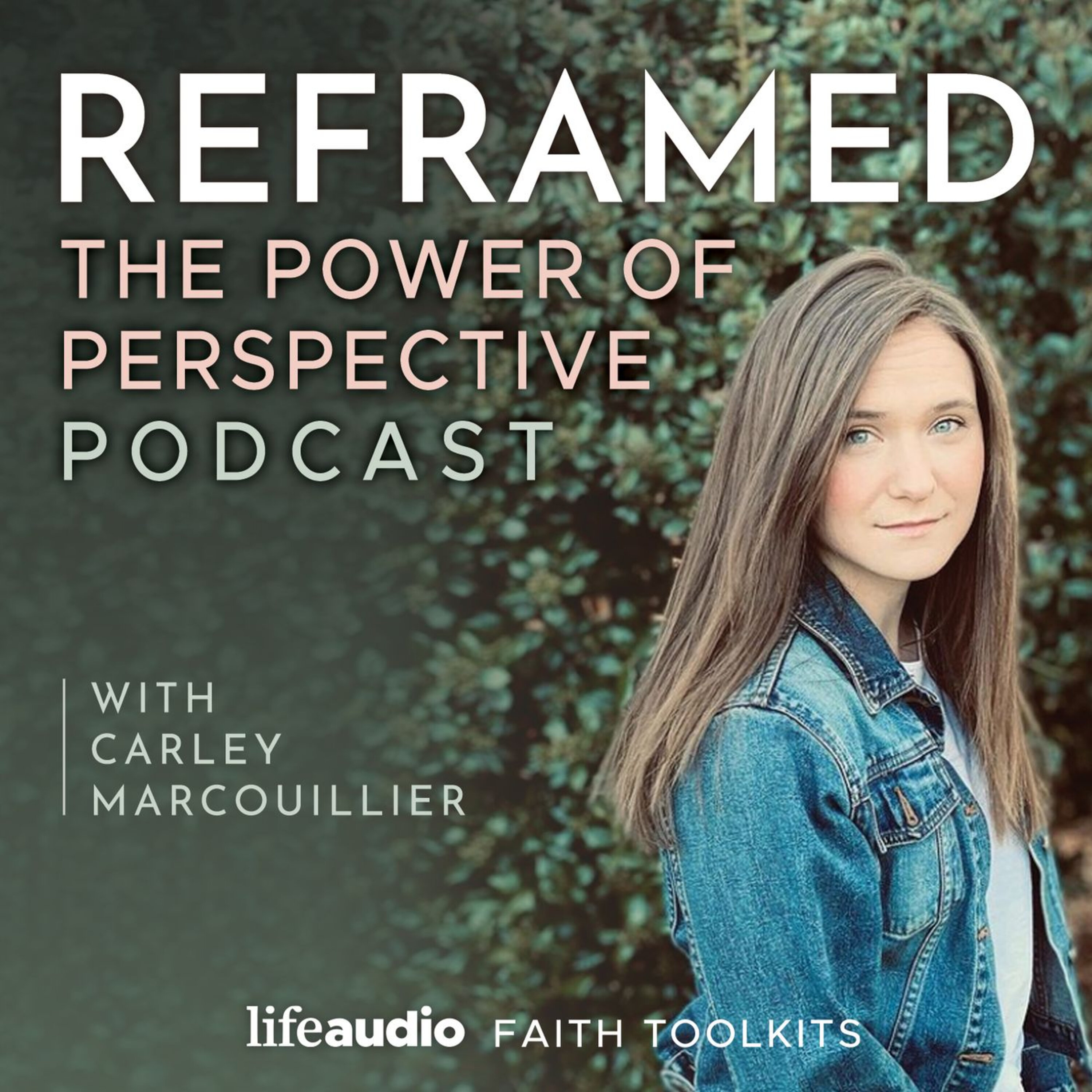
Signs and Symptoms of Emotionally Unhealthy Spirituality with Brenton Lehman

August 25, 2021 - 35 min
Today I am excited to be introduced to a special guest on the podcast my Pastor, and spiritual mentor, Brenton Lehman. Brenton is the discipleship and teaching pastor at my home church, Gospel Community, here in Lynchburg, Va.Over the last year, I have been working with Brenton and the staff here at Gospel as a ministry resident and learning so much from a spiritual formation and discipleship perspective. I felt that it was only fitting that at the completion of my time as a ministry resident, we discuss a topic that is near and dear to both therapy work and pastoral care.One of the biggest problems I have come to in church culture throughout my time in ministry is the propensity to disconnect or dismiss the presence of emotional distress or pain for the sake of spiritual maturity.In this episode, we cover:A. Spiritual bypassing – what it is and how it shows up in our lives:Denial or repression of feelings – “I’m not lonely, I have Jesus”Dismissing others’ emotions – “Count it all joy”Focusing only on the positive – “It will all work together for good”Over-using spiritual statements as the solution to distress – “Everything happens for a reason”B. What does it mean to steward our emotions well?1. Remember that you can’t unlink spiritual and emotional maturity. 2. Stop labeling emotions as bad or good 3. Recognize emotions as needs4. Bring needs to JesusResources:Allison Coke: The Danger of Bypassing Your EmotionsCheck out Pete Scazzero’s work – EmotionallyHealthy.orgFollow Carley:Website | Instagram | FacebookTo access more content and join my monthly email list for the latest episodes and info, visit my website at carleymarcouillier.comEpisode Image Credit: Getty/Aleksei Morozov Discover more Christian podcasts at lifeaudio.com and inquire about advertising opportunities at lifeaudio.com/contact-us.
Meet Your Host

A northerner by heart and southerner by choice, Carley currently calls Virginia her home. After completing her Master’s degree in clinical mental health counseling, Carley began to develop a passion for integrating the principles of counseling practice with the foundation of Christian theology. In addition to her clinical work, Carley is passionate about discussing topics of faith, theology, psychology, and everything in between on her social media platforms:
FOLLOW Therapy + Theology on Instagram!
https://www.instagram.com/therapyandtheologypodcast/
FOLLOW CARLEY:
Website: https://www.carleymarcouillier.com/
ASK CARLEY!
Do you have a question or topic you want to be discussed on a future Q+A episode? Carley would love to hear from you! Record your message here, and Carley just might answer it on the next episode! https://www.speakpipe.com/therapyandtheology
FOLLOW Therapy + Theology on Instagram!
https://www.instagram.com/therapyandtheologypodcast/
FOLLOW CARLEY:
Website: https://www.carleymarcouillier.com/
ASK CARLEY!
Do you have a question or topic you want to be discussed on a future Q+A episode? Carley would love to hear from you! Record your message here, and Carley just might answer it on the next episode! https://www.speakpipe.com/therapyandtheology
